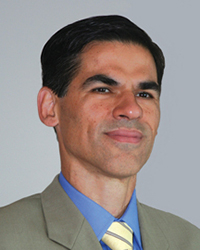
Marcos F. Vidal Melo, MD
News of clinical trials has captured the attention of the general public for months, as COVID-19 vaccines advance at record pace. That same thirst for knowledge is expected to captivate seasoned clinicians attending the annual meeting who already have a moderate to advanced understanding of clinical trials in anesthesiology.
Monday’s session “Large Clinical Trials in Anesthesiology: Advanced Methodology and Management” is designed to accelerate learning and expand the network for anesthesiologists performing or seeking guidance in planning and implementing trials appropriately. Session Moderator Marcos F. Vidal Melo, MD, of the Department of Anesthesia, Critical Care and Pain Medicine at Massachusetts General Hospital in Boston, said the COVID-19 era “definitely amplified the relevance of this session.” According to Dr. Vidal Melo, a number of academic anesthesiologists have advanced clinical trials for anesthesiology nationally and internationally, despite a lag behind other practices.
“The field of anesthesiology has not benefited from results derived from clinical trials as much as other fields,” Dr. Vidal Melo said. “For instance, cardiology and critical care experts have been historically more active in establishing evidence for their practices based on trials. In recent years, there has been a realization that those studies are key to our field, and leaders throughout the world have invested enormous effort in bringing the field to a new level in our specialty.”
Large Clinical Trials in Anesthesiology: Advanced Methodology and Management
9-11 a.m. CT
Monday, October 5
Among the topics to be discussed at the session will be a focus on current statistical requirements for major trials and the impact of big data. For example, he said, while hypothesis-generating findings can be derived from big data, careful analytical approaches are necessary to obtain meaningful definitive information. Unfortunately, that is not always possible in some cases.
Another topic that is front and center relates to specific challenges and remedies for clinical trials in pediatric anesthesia. These are challenging in many aspects, Dr. Vidal Melo said, due to the distinct physiology of the child, variables at different stages of development, and because of ethical considerations given that participants are children, who are unable to provide an entirely informed consent. In this case, he said, parental involvement becomes essential, with the requirements of parental permission and participant assent.
“It should be kept in perspective that it would be greatly unfair to children not to offer them the high quality of medical management evidence derived from clinical trials,” Dr. Vidal Melo said.
No discussion of clinical trials is complete without talking about the business side of advancing medicine. In this session, presenters will discuss funding as well as key steps in the post-funding phase. According to Dr. Vidal Melo, several steps are required once funding is ascertained, including creating a schedule for utilization of resources, interacting with the funding institution and the institutions involved in the project execution, assessing the current knowledge in the field, building the investigative team, and creating requirements for project implementation.
“Accountability and timeliness are key in the implementation of projects,” he said.
Return to Index